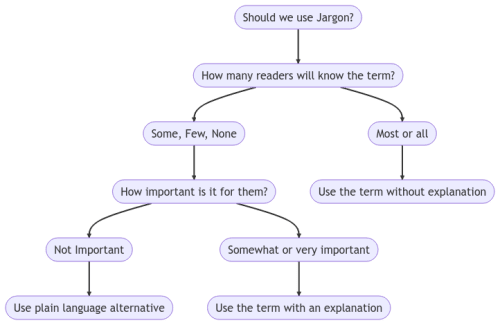Be Mindful of Jargon
One of the hardest things for me to do when writing is to avoid jargon or assume that everyone will understand what I mean.
In Dealing with Technical or Professional Jargon, the author presents an interesting analysis of jargon in technical documents.
The first consideration that I find interesting is that jargon is defined by the audience reading the document. In other words, do they understand the term?

So how do we address jargon on our pages?
It all starts with the users.
Who is your audience? If you have a narrow audience with similar knowledge about the subject and skill levels then what appears to be jargon will be easy for them to understand.
But most sites don't have the advantage of a narrow audience or an audience with similar, advanced, knowledge of the subject.
So let your users help you:
- Look at your analytics data. It is safe to assume that terms that people search for often are familiar to them
- If you do surveys and interviews pay attention to how users communicate with you.
- If you do user research, pay attention to how your users read your content and what words may be difficult or unclear for them
You then have to determine how important the jargon is for your audience to learn.
If you expect that most of your audience will not be familiar with the text, use the plain-language version first with the technical term in parenthesis, like this:
plain-language alternative (technical term)
But if you expect that the majority of your audience to be familiar with the term, but some users won’t be, you can flip the order and use the technical term first followed by a non-technical alternative
CSS (cascading style sheets, the web styling language)
In either case the parentheses act as a signal that the text inside them is secondary — unless you need the explanation to help your understanding, you skip the content in parentesis and continue scaning the content.
If it's not very important then you may want to replace it with a more common word.
This replacement may alter the meaning of the term, but for your non-technical audience the different may not be noticeable like it would be for technical experts.
One other item to consider: Context is important and may require more than the short parenthetical definition you provide. Meaning may be different for the reader than what you mean with the term.
